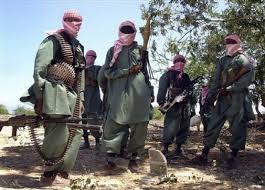By Abdi Sheikh and Feisal Omar
MOGADISHU (Reuters) – The Islamist group al Shabaab said on Friday its fighters killed dozens of Kenyan troops when they attacked a remote military base in Somalia the previous day, a claim the Kenyan army denied.
A spokesman for al Shabaab, which often launches attacks on troops of the African Union’s AMISOM force, said its fighters killed at least 57 Kenyans at the base in the southern town of Kulbiyow, near the Kenyan border.
“That is false,” Kenyan military spokesman Lieutenant Colonel Paul Njuguna told Reuters, in reference to al Shabaab’s claim that 57 soldiers were killed although he did not give any casualty figures.
“The operation is ongoing. We are receiving updates,” the officer added.
Kenyan television channel NTV reported in a headline that “several KDF (Kenya Defence Forces) soldiers believed killed” in the raid and heavy fighting was reported.
In January 2016, al Shabaab said it had killed more than 100 Kenyan soldiers in El Adde, a Somali camp near the border with Kenya. The Kenyan military never gave details of casualties, but Kenya media reports suggested a toll of that magnitude.
“We are pursuing the Kenyan soldiers who ran away into the woods,” Sheikh Abdiasis Abu Musab, al Shabaab’s military operation spokesman, told Reuters about Friday’s attack.
“Two mujahideen (fighters) rammed suicide car bombs into the base in Kulbiyow town before storming it,” he said, adding that as well as counting 57 Kenyan bodies, the group seized vehicles and weapons.
“We have taken over the base.”
Al Shabaab, whose assessment of casualties often differs markedly from official versions, typically rams the entrance to a target site with a car or truck bomb so fighters can storm in.
The group, which once ruled much of Somalia, wants to topple the Western-backed government in Mogadishu and drive out the peacekeepers made up of soldiers from Kenya, Djibouti, Uganda, Ethiopia and other African countries.
Driven out from the capital Mogadishu in 2011, al Shabaab has been fighting for years to impose its strict interpretation of Islam on Somalia.
African Union and Somali troops have driven al Shabaab fighters from major urban strongholds and ports, but they have often struggled to defend smaller, more remote areas from attacks.
(Writing by Aaron Maasho; Editing by Edmund Blair)











